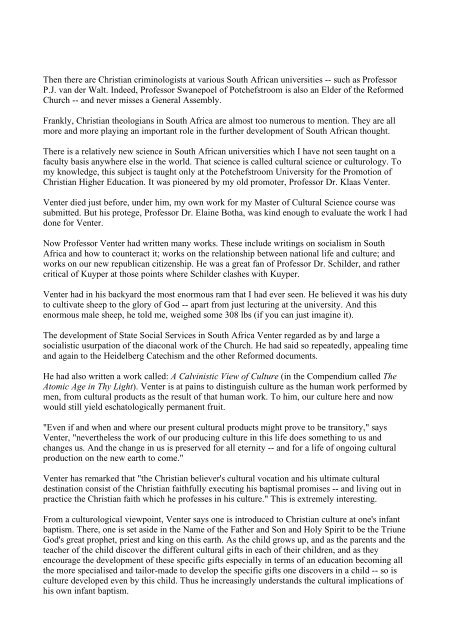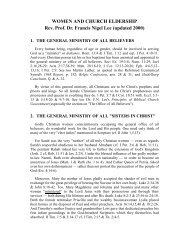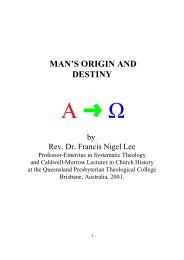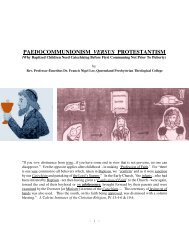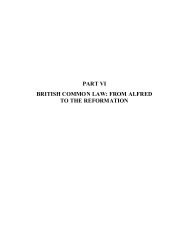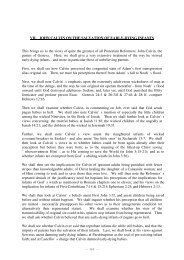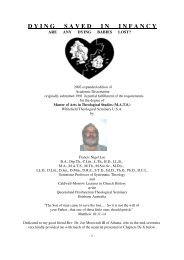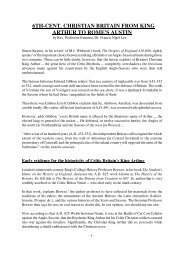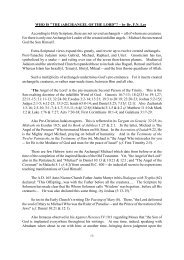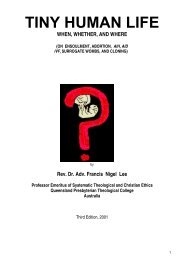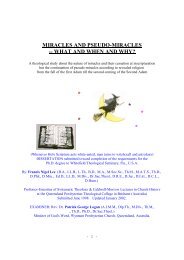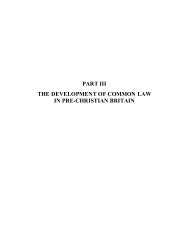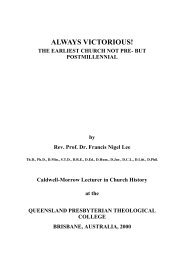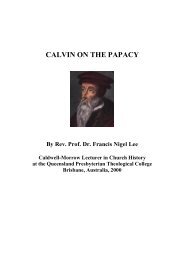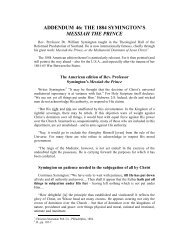future, regardless <strong>of</strong> any developments in other countries. From time to time -- if things look likethey may cause a drop in the growth rate -- South African gold tycoons simply withhold gold saleson the world market. That, <strong>of</strong> course, drives up the price <strong>of</strong> gold. In that way, by releasingcontrolled amounts <strong>of</strong> gold onto the world market each month, they are able to sustain a steadygrowth rate -- regardless <strong>of</strong> vacillating or even falling growth rates in other important tradingcountries throughout the world.Coming now to Christian aestheticians, we have important figures such as D.F. Malherbe. He isperhaps the pioneer <strong>of</strong> modern Afrikaans writers, with his masterly work Hans die Skipper(meaning John, the Ship's Captain) -- a very fine novel about the sea. He has also written beautifulpoems about the relationship between Sisera and Deborah, and other works too.Pr<strong>of</strong>essor Dekker <strong>of</strong> Potchefstroom University has written extensively on art theory and also on thehistory and development <strong>of</strong> Afrikaans literature -- as well as giving a systematisation <strong>of</strong> the variouswritings <strong>of</strong> Afrikaans writers.Pr<strong>of</strong>essor D.P. van der Walt has written extensively in this field. He has especially explored thearea <strong>of</strong> a Christian's attitude toward pornography as an art-form -- and the legal obligations <strong>of</strong>censorship in relation to art-forms deemed to be objectionable by many sections <strong>of</strong> the population.<strong>The</strong>n there are Christian legal philosophers and political philosophers -- men like the celebrated Dr.L.J. du Plessis, Pr<strong>of</strong>essor <strong>of</strong> Political Science at Potchefstroom University, from whose pen I readextensively the other day (on Calvin's doctrine <strong>of</strong> the calling <strong>of</strong> the State to implement the TenCommandments). He is an international figure -- and is regarded as the best in that field even byDutch thinkers.Pr<strong>of</strong>essor Herman Strauss, whom I referred to in the last lecture, has written extensively in the field<strong>of</strong> civilisation and the qualified franchise in countries with different groups <strong>of</strong> people and withdifferent levels <strong>of</strong> civilisation such as South Africa. He has also given theoretical reflection to this-- as well as to the attitude Christians should sustain towards trade unions (whether they bevoluntary trade unions, or compulsory trade unions, as the case may be).<strong>The</strong>re is also Judge G.F. de Vos Hugo. He has written many monographs on the nature <strong>of</strong> Law andthe extent to which the Law Courts should have some elasticity in their application <strong>of</strong> the principles<strong>of</strong> Law to specific cases brought before the Courts.<strong>The</strong>re is further my old Co-Promoter, Dr. Vessels, Pr<strong>of</strong>essor <strong>of</strong> Political Science at the University<strong>of</strong> the Orange Free State. He is a great critic <strong>of</strong> the United Nations Organisation -- and a man whohas written much on the eschatology <strong>of</strong> political development and also on the idea <strong>of</strong> statesovereignty on the international scene.Also, Dr. A.P. Treurnicht wrote a doctoral dissertation under Andrew Murray's grandson, my ownpromoter, Pr<strong>of</strong>. Dr. Andrew H. Murray at the University <strong>of</strong> Cape Town. Treurnicht's dissertation, astandard work, is on <strong>The</strong> Relationship Between Church and State in the Thought <strong>of</strong> AbrahamKuyper. Treurnicht, a minister <strong>of</strong> the Gospel and later editor <strong>of</strong> the Kerkbode (or "ChurchMessenger") magazine, left the pulpit to enter politics. <strong>The</strong>re he speedily became a Member <strong>of</strong>Parliament, and then Leader <strong>of</strong> the National Party in the Transvaal.He is about the second most powerful man in South Africa today (on the political scene). He waskind enough to write an introduction to my own work <strong>The</strong> Central Significance <strong>of</strong> Culture, (whichis printed up in the front <strong>of</strong> that book). He has also written many other works, such as PartyPolitics and the Future <strong>of</strong> the Afrikaner's National Culture.
<strong>The</strong>n there are Christian criminologists at various South African universities -- such as Pr<strong>of</strong>essorP.J. van der Walt. Indeed, Pr<strong>of</strong>essor Swanepoel <strong>of</strong> Potchefstroom is also an Elder <strong>of</strong> the ReformedChurch -- and never misses a General Assembly.Frankly, Christian theologians in South Africa are almost too numerous to mention. <strong>The</strong>y are allmore and more playing an important role in the further development <strong>of</strong> South African thought.<strong>The</strong>re is a relatively new science in South African universities which I have not seen taught on afaculty basis anywhere else in the world. That science is called cultural science or culturology. Tomy knowledge, this subject is taught only at the Potchefstroom University for the Promotion <strong>of</strong>Christian Higher Education. It was pioneered by my old promoter, Pr<strong>of</strong>essor Dr. Klaas Venter.Venter died just before, under him, my own work for my Master <strong>of</strong> Cultural Science course wassubmitted. But his protege, Pr<strong>of</strong>essor Dr. Elaine Botha, was kind enough to evaluate the work I haddone for Venter.Now Pr<strong>of</strong>essor Venter had written many works. <strong>The</strong>se include writings on socialism in SouthAfrica and how to counteract it; works on the relationship between national life and culture; andworks on our new republican citizenship. He was a great fan <strong>of</strong> Pr<strong>of</strong>essor Dr. Schilder, and rathercritical <strong>of</strong> Kuyper at those points where Schilder clashes with Kuyper.Venter had in his backyard the most enormous ram that I had ever seen. He believed it was his dutyto cultivate sheep to the glory <strong>of</strong> God -- apart from just lecturing at the university. And thisenormous male sheep, he told me, weighed some 308 lbs (if you can just imagine it).<strong>The</strong> development <strong>of</strong> State Social Services in South Africa Venter regarded as by and large asocialistic usurpation <strong>of</strong> the diaconal work <strong>of</strong> the Church. He had said so repeatedly, appealing timeand again to the Heidelberg Catechism and the other Reformed documents.He had also written a work called: A Calvinistic View <strong>of</strong> Culture (in the Compendium called <strong>The</strong>Atomic Age in Thy Light). Venter is at pains to distinguish culture as the human work performed bymen, from cultural products as the result <strong>of</strong> that human work. To him, our culture here and nowwould still yield eschatologically permanent fruit."Even if and when and where our present cultural products might prove to be transitory," saysVenter, "nevertheless the work <strong>of</strong> our producing culture in this life does something to us andchanges us. And the change in us is preserved for all eternity -- and for a life <strong>of</strong> ongoing culturalproduction on the new earth to come."Venter has remarked that "the Christian believer's cultural vocation and his ultimate culturaldestination consist <strong>of</strong> the Christian faithfully executing his baptismal promises -- and living out inpractice the Christian faith which he pr<strong>of</strong>esses in his culture." This is extremely interesting.From a culturological viewpoint, Venter says one is introduced to Christian culture at one's infantbaptism. <strong>The</strong>re, one is set aside in the Name <strong>of</strong> the Father and Son and Holy Spirit to be the TriuneGod's great prophet, priest and king on this earth. As the child grows up, and as the parents and theteacher <strong>of</strong> the child discover the different cultural gifts in each <strong>of</strong> their children, and as theyencourage the development <strong>of</strong> these specific gifts especially in terms <strong>of</strong> an education becoming allthe more specialised and tailor-made to develop the specific gifts one discovers in a child -- so isculture developed even by this child. Thus he increasingly understands the cultural implications <strong>of</strong>his own infant baptism.
- Page 1 and 2:
THE CHRISTIAN AFRIKANERSA Brief His
- Page 3 and 4:
God richly bless the following lect
- Page 5 and 6:
There have always been, and always
- Page 7 and 8:
But the only one they both appeal t
- Page 9 and 10:
Now Zuidema was a very great Dutch
- Page 11 and 12:
Dutch churches at the Synod of Dord
- Page 13 and 14:
station -- to help the Dutch ships
- Page 15 and 16:
It is a country dedicated to freedo
- Page 17 and 18:
1760 -- there was more and more dis
- Page 19 and 20:
with the Dutch. Many moved farther
- Page 21 and 22:
said: "The British have placed our
- Page 23 and 24:
financed by White money. It is buil
- Page 25 and 26:
Famous Boer Generals, left to right
- Page 27 and 28:
Three: Unannihilated: the Resurrect
- Page 29 and 30:
(who had arrived in the country onl
- Page 31 and 32:
of success.I may add that White Sou
- Page 33 and 34:
General Beyers felt that those text
- Page 35 and 36:
Balfour Declaration. The gist of it
- Page 37 and 38:
Africa; treks on into the land both
- Page 39 and 40:
Four: The Eschatology of Victory in
- Page 41 and 42:
ide -- to use the instrumentality o
- Page 43 and 44:
Christian National Calvinist Public
- Page 45 and 46:
through constitutional process it h
- Page 47 and 48: I guess the best way to describe Sm
- Page 49 and 50: He was followed after his assassina
- Page 51 and 52: So the Scots came. I am going to sp
- Page 53 and 54: the Reformed Church in South Africa
- Page 55 and 56: ook on Hebrews. But his greatest wr
- Page 57 and 58: At that point, Du Plessis enquired
- Page 59 and 60: Yet quite apart from this high view
- Page 61 and 62: One last point. There is a tremendo
- Page 63 and 64: African Republic in 1902, the Cape
- Page 65 and 66: One of the most important Calvinist
- Page 67 and 68: Pellissier, who wrote on music and
- Page 69 and 70: perspective -- even while he minist
- Page 71 and 72: ever encountered by the Whites in S
- Page 73 and 74: Now the United States does not need
- Page 75 and 76: majority of the White citizens are
- Page 77 and 78: Now you will not find in any of Sto
- Page 79 and 80: Finally, Stoker argues that the so-
- Page 81 and 82: This then brings Stoker to another
- Page 83 and 84: This Brummer just referred to, is a
- Page 85 and 86: Man was to rejoice in this nature (
- Page 87 and 88: enhanced. For, in the present, man
- Page 89 and 90: he declared, riddled with the ungod
- Page 91 and 92: Van der Waal is a very brilliant So
- Page 93 and 94: World War II when he was hiding fro
- Page 95 and 96: The Professor of Philosophy -- or I
- Page 97: glory.There are also Christian psyc
- Page 101 and 102: Massachusetts at Gordon- Conwell fo
- Page 103 and 104: well known -- is being pioneered in
- Page 105 and 106: people in South Africa. The South A
- Page 107 and 108: nature and of human culture (Prover
- Page 109 and 110: The parousia of Jesus Christ will i
- Page 111 and 112: more and more christianised. Later
- Page 113: END


